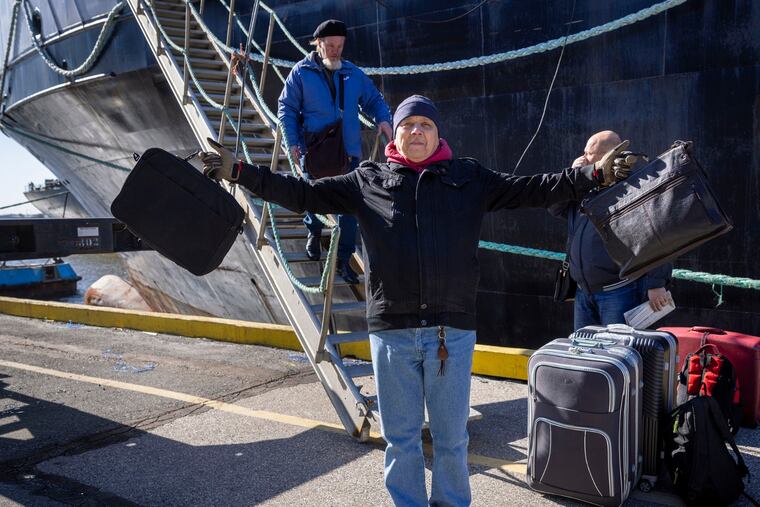After months stuck on a merchant ship docked in Philly, Ukrainian sailors finally touch land
The Ukrainians have been docked in Philadelphia and tied up in a legal dispute.

The seven Ukrainian sailors who have been stuck on a merchant ship docked in Philadelphia as Russia invaded their country have finally been allowed to come ashore — into the embrace of Philadelphia’s Ukrainian community.
The seafarers left the ship Wednesday morning and received permission at the U.S. Customs and Border Protection office in Old City to stay in the country while their homeland is at war, according to Iryna Mazur, a Philadelphia lawyer and honorary consul of Ukraine.
The men were earlier spared from detention, which had been another possibility.
For nine months, one week, and four days, the ship’s captain, Gennadiy Shevchenko, and his crew had been confined to the Ocean Force merchant ship, a 348-foot-long, 66-foot-wide cargo vessel docked first in Delaware and since February in South Philadelphia, at Pier 82. They had been performing maintenance and keeping the ship running while attorneys and advocates tried to sort out their future.
Since the Russians invaded the crew’s homeland on Feb. 24, more than 4.9 million Ukrainians have fled their country. The Biden administration has agreed to resettle 100,000 Ukrainians. The men of the Ocean Force will stay at private residences around Philadelphia, Mazur said, joining about 60,000 émigrés and people of Ukrainian ancestry, one of the largest Ukrainian communities in the nation.
“Everything is set and ready and we are getting ready for everyone that is coming here,” said Roman Zhukov, a volunteer with the Ukrainian consul.
The men have followed the news of war from their ship. They say they have lost friends but not family members.
Boatswain Sergiy Kuzhbarenko, 53, has a 5½-year-old daughter in Mariupol, the war-torn city in southeastern Ukraine where, according to its mayor, more than 10,000 civilians have been killed.
The first opportunity Kuzhbarenko has, he says, he wants to see her face. He misses home “heartily,” he said via the captain, who translated for many of the crew members.
Help has come from Barbara Shipley from the International Transport Workers’ Federation, the Seamen’s Church Institute, Mazur, and J. Stephen Simms, a Baltimore maritime attorney, who have been working to ensure the crew received back pay — they got nothing between November and March — and figure out what will happen to the crew.
The heavy-load carrier’s previous owner ran out of money, according to a lawsuit filed in federal court in Delaware. On March 1, ownership of the ship changed hands, and the new boss has been paying the crew to keep the vessel running until now, when it can be towed for repair in the Caribbean.
Back in March the crew members were awarded the funds they had not been paid since November. That money will help them settle in Philadelphia’s Ukrainian community until it is safer for them to return home.
In the meantime, they want jobs, their captain said.
But they don’t know if their legal status will allow them to work here. They know little of what awaits them.
Vitaliy Boyko’s daughter turned 12 on March 14. Throughout that day, the ship’s third officer was able to speak to her and his wife, but being so far away from them tears at him. Watching the news, seeing his country at war, is wrenching.
”War is war. It’s always the same. It’s blood and tears,” the 53-year-old said.
Once he gets a couple of days of rest, Boyko is hoping to find work and contribute to the country that’s taken him in — until the first chance arrives for him to return to his loved ones.
“I’m not gonna stay in United States forever,” he said. “What I will do? My family is there, I am here. I will try to earn money and then go back.”
Most of the crew agreed. While they welcome the chance to see the city after spending so many days at sea and docked, they cannot stop thinking about home. Although they said that their families are safe, that doesn’t mean they don’t worry about them.
Most of the crew are from Odesa, which more than one of them called the “greatest city in the world.” The strategic Black Sea port boasts an impressive opera house that is now heavily guarded to prevent Russian attack.
“Every space, every building, they have their own history,” Shevchenko said. “The city is full of history.”
Andriy Tiupa, a 19-year-old steward on the Ocean Force, said he misses his parents, siblings, and fiancée. He had enrolled in a naval college the year before going to sea and had envisioned his work on the ship as a few months of good, practical experience.
Standing outside the customs office, he said he was looking forward to getting something to eat in Philadelphia, getting some rest, and then finding work so he can provide a little for his family back home.
”I’m very grateful that we received all the help that we got,” he said. “And regardless of all the emotions that we experienced, I still am very grateful that I had this experience in my life.”